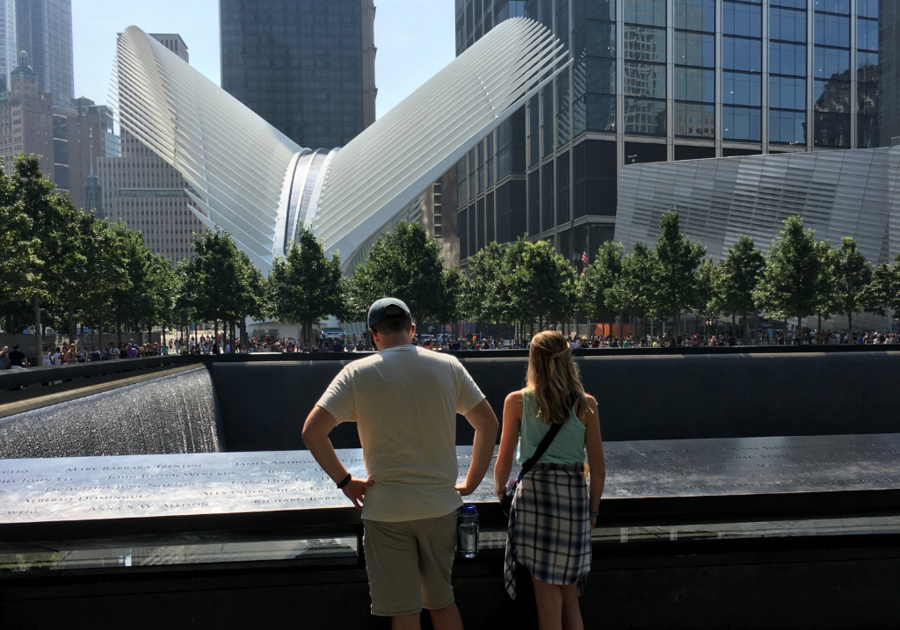Where were you on Tuesday, September 11, 2001, when terrorists hijacked four airplanes?
Although we may not be able to recall what we ate for breakfast yesterday, many of us can remember precisely where we were and what we were doing 20 years ago.
At the time, I was engaged to be married, living in New Jersey with my now-husband, and working in lower Manhattan. We took the PATH train to work and walked out of the World Trade Center that morning just 17 minutes before the first plane hit.
Today I am the mother of two boys who are now old enough to be told about what my husband and I experienced on that day, as well as the weeks and months that followed the horrific event. Although it is never an easy topic for me to discuss, I believe that it honors all those who died when I do.
I want my children to know about the innocent people who lost their lives, as well as all the first responders who made the ultimate sacrifice trying to help everyone who remained in the towers. At the same time, I want them to continue to feel safe and secure in this sometimes scary and unpredictable world.
I am reminded of this beautiful quote from one of my all-time favorite people:
"When I was a boy and I would see scary things in the news, my mother would say to me, 'Look for the helpers. You will also find people who are helping.' To this day, especially in times of 'disaster,' I remember my mother's words, and I am always comforted by realizing that there are still so many helpers — so many caring people in this world." –Fred Rogers
TALKING TO YOUR KIDS
If you feel your children are ready to learn more, the American Academy of Child and Adolescent Psychiatry offers some practical guidelines for discussing war and terrorism with children:
- Use words and concepts your child can understand. Make your explanation appropriate to your child's age and level of understanding. Don't overload a child with too much information.
- Remember that children tend to personalize situations. For example, they may worry about friends or relatives who live in a city or state associated with incidents or events.
- Help children find ways to express themselves. Some children may not be able to talk about their thoughts, feelings, or fears. They may be more comfortable drawing pictures, playing with toys, or writing stories or poems directly or indirectly related to current events.
- Acknowledge and support your child's thoughts, feelings, and reactions. Let your child know that you think their questions and concerns are important.
- Avoid stereotyping groups of people by race, nationality, or religion. Use the opportunity to teach tolerance and explain prejudice.
- Don't let children watch lots of violent or upsetting images on TV. Repetitive frightening images or scenes can be disconcerting, especially to young children.
- Coordinate information between home and school. Parents should know about activities and discussions at school. Teachers should know about the child's specific fears or concerns.
- Let children be children. They may not want to think or talk a lot about these events. It is OK if they'd rather play ball, climb trees, ride their bike, etc.
LOCAL EVENTS:
- 9/11 20th Anniversary Community Remembrance at O'Brien Park in Parker
- 9/11 Flag of Honor Across America Memorial at Lone Tree Municipal Building
- 9/11 Flag of Honor Across America Memorial at Parker Town Hall
- 9/11 Memorial Stair Climb at Red Rocks Park and Amphitheatre (advance registration required)
- 20th Anniversary "Never Forget" Virtual Run at a time and location that works for you
BOOKS FOR CHILDREN:
- 10 True Tales: Heroes of 9/11 by Allan Zullo
- September 11: Then and Now by Peter Benoit
- September 11: We Will Never Forget by Peter Benoit
- America is Under Attack: September 11, 2001 - The Day the Towers Fell by Don Brown
- Animal Rescuers: A Chapter Book by Rosanna Hansen
- Dog Heroes of September 11th by Nona Kilgore Bauer
- I Survived the Attacks of September 11, 2001 by Lauren Tarshis
- 14 Cows for America by Carmen Agra Deedy
- With Their Eyes: September 11th - The View from a High School at Ground Zero by Annie Thomas
- Thunder Dog: The True Story of a Blind Man, His Guide Dog, and the Triumph of Trust at Ground Zero by Michael Hingson
- September 12th: We Knew Everything Would Be All Right by Masterson Elementary Students
DID YOU KNOW? Since 2009, September 11 has been honored as a National Day of Service, allowing everyone to become a helper. Visit www.americorps.gov or VolunteerConnectDC.org to find volunteer opportunities right here in our community, some of which are open to families. Or gather some friends to make Blessing Bags for the Homeless.



